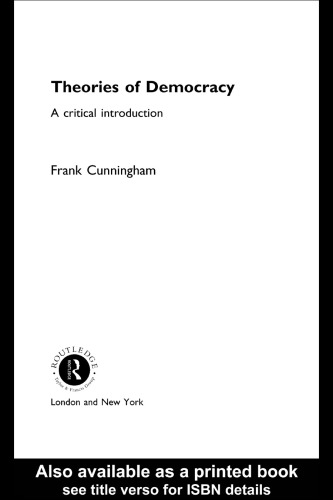

Most ebook files are in PDF format, so you can easily read them using various software such as Foxit Reader or directly on the Google Chrome browser.
Some ebook files are released by publishers in other formats such as .awz, .mobi, .epub, .fb2, etc. You may need to install specific software to read these formats on mobile/PC, such as Calibre.
Please read the tutorial at this link. https://ebooknice.com/page/post?id=faq
We offer FREE conversion to the popular formats you request; however, this may take some time. Therefore, right after payment, please email us, and we will try to provide the service as quickly as possible.
For some exceptional file formats or broken links (if any), please refrain from opening any disputes. Instead, email us first, and we will try to assist within a maximum of 6 hours.
EbookNice Team

Status:
Available4.8
31 reviews
ISBN 10: 0203466241
ISBN 13: 9780203466247
Author: F Cunningham, Frank Cunningham
This is the first book to be published in this exciting new series on political philosophy. Cunningham provides a critical and clear introduction to the main contemporary approaches to democracy: participatory democracy, classic and radical pluralism, deliberative democracy, catallaxy, and others. Also discussed are theorists in the background of current democratic thought, such as Tocqueville, Mill, and Rousseau. The book includes applications of democratic theories including an extended discussion of democracy and globalisation.
1 Introduction
Conceptualizing democracy
Exercise
Touchstone theorists
Aristotle
Tocqueville
Schumpeter
Some lessons
2 Problems of democracy
The tyranny of the majority
Massification of culture and morals
Ineffective government
Conflicts
Demagogy and the empty space of democracy
Mask of oppressive rule
Democracy as irrational
Conditions for democracy
Putnam and Schumpeter
Protective and developmental democracy
Alternative conditions
3 Liberal democracy
J.S. Mill's formulation
Varieties of liberal-democratic theory
Participation
Equality
The relation between democracy and liberalism
The role of philosophical underpinnings
Flexibility and prioritization
Developmentalism and protectivism
The encumbered self
Freedom and autonomy
Positive and negative liberty
Limits of tolerance and the public/private boundary
The nation state
Recap
4 Liberal democracy and the problems
Massification of culture
The tyranny of the majority
The civic republican challenge
Critique of autonomy
The unencumbered self and communitarianism
Aristotelian and Ciceronian civic republicanism
Testing civic republicanism
Ineffective government
Ethno/national conflict
Group loyalties
Competition
The empty space of democracy
Irrationality
Mask of oppression
5 Classic pluralism
Neo-Hobbesist political sociology
Interest groups
Interests
Power
The Madisonian heritage
The state
Leadership
Political culture
Pluralism and problems of democracy
Consociational democracy
Majority tyranny and the empty space
Mask of minority domination
Dahl's odyssey
Discussion: Representation
For and against representative democracy
The nature of representation
Special group representation
6 Catallaxy
The catallactic theorists
Political parties
Voter abstention
Democratic decision-making
Prescriptive implications
Neoliberalism
Government predation
The rational impossibility of state action
Rationality in the service of competition
Social choice theory and catallaxy
Problems of democracy
Irrationality and conflict
Tyranny of the majority
Demagoguery
Oppressive rule
7 Participatory democracy
Rousseau
Rousseau and participationism
Sovereign people and delegated government
State and civil society
The general will and the will of all
Forced to be free
Problems of democracy
Oppression
Irrationality
Majority tyranny and the empty space
Popular culture
Effectiveness and social capital
Realism
Associative democracy
Participationism as a project
Participationism in context
8 Democratic pragmatism
Challenges to democratic progress
9 Deliberative democracy
The core theory
Legitimation
Fixed preferences
Aggregation
Consensus and the common good
Weakened participationism/republicanism or fortified liberalism?
Variations
Transcendence of theoretical divides
Grounds for confidence
Hypothetical consensus
Limited application
Reflective equilibrium
Transcendentalism
Critical social philosophy
Communicative action
Deliberative democracy and some problems
Tyranny of the majority
Irrationality
The empty space
Oppression
10 Radical pluralism
Democracy's empty space and conflicts
Some poststructuralist themes
Metanarratives
Language games
Identifications
Power and hegemony
The politics of radical pluralism
Reductionism
Liberal democracy and capitalism
Liberal democracy and Carl Schmitt
Alternative theories
Reactions to radical pluralism
Radical pluralism and the problems
The empty space and conflict
Oppression
The tyranny of the majority
11 Applying democratic theories: globalization
Globalization
States and the globe
Democratic boundaries
Realism
Orientations toward globalization and democracy
Cosmopolitanism
State-based responses
People power
Democratic theories and globalization
Liberal democracy
Civic republicanism
Deliberative democracy
Participatory democracy
Radical pluralism
Pragmatism
Bibliography
Subject Index
Name index
theories of democracy a critical introduction
theories of democracy a critical introduction pdf
theories on democracy
introduction to critical theory pdf
critical democratic theory
democracy theories
Tags: F Cunningham, Frank Cunningham, Democracy, Critical